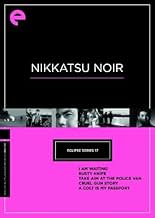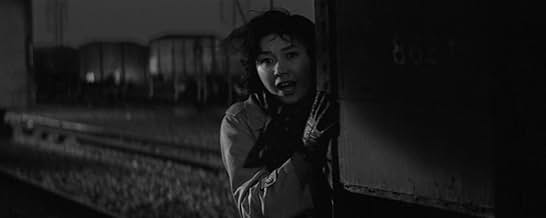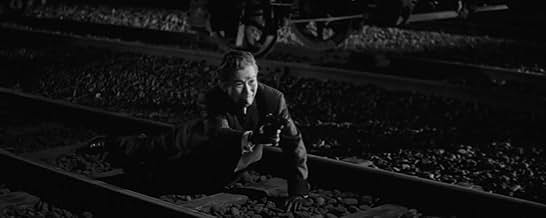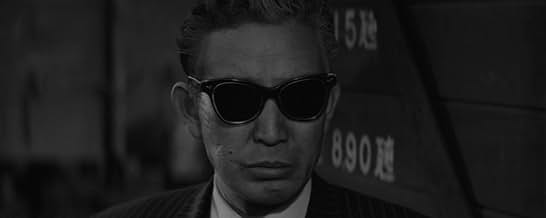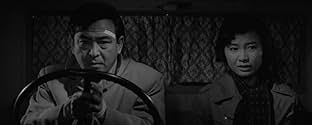CALIFICACIÓN DE IMDb
6.6/10
1.4 k
TU CALIFICACIÓN
Agrega una trama en tu idiomaA prison truck is assaulted and the two convicts inside are murdered. The prison guard on duty gets suspended for negligence and takes it upon himself to track down the killers.A prison truck is assaulted and the two convicts inside are murdered. The prison guard on duty gets suspended for negligence and takes it upon himself to track down the killers.A prison truck is assaulted and the two convicts inside are murdered. The prison guard on duty gets suspended for negligence and takes it upon himself to track down the killers.
- Dirección
- Guionistas
- Elenco
- Dirección
- Guionistas
- Todo el elenco y el equipo
- Producción, taquilla y más en IMDbPro
Opiniones destacadas
A 1960 police actioner from writer/director Seijin Suzuki (Branded to Kill/Tokyo Drifter) about a disgraced prison guard, Michitaro Mizushima, who loses some of his charges during a shootout during a nighttime transfer. Taking the law into his own hands but also at some point in the story cops are brought in, Mizushima tracks down the players behind the act siding up to the moll of one of the crooks in the hopes of getting back some dignity he suffered from the escape. As per Noir Alley's host Eddie Muller, the film was a revelation to Japanese audiences, especially the younger sect, which embraced the film embarrassing the honchos at the film studio but now 64 years after the fact the film is fine but ultimately safe when a lot of the gunfights which may've lit a fire under the viewing public butts now feel like so much uncontrolled chaos but the throughline of the plot is solid enough though.
Twisty detective flick from the director of Branded to Kill. After the police van of which he was in charge is ambushed by a sniper, prison guard Michitaro Mizushima (the star of the earlier Suzuki film Underworld Beauty) is suspended from his job. Upset over his failure to protect those under his charge, Mizushima conducts his own investigation. This is an extremely convoluted mystery - a fact to which the film cops. Suzuki's master direction keeps it moving. The opening and closing sequences in particular are brilliant. I just wish I knew what the Hell was going on! I was very tired while watching it, I should say.
Suzuki would go on to do wonders with abstraction and suggestive atmosphere in his later films but this is mostly a compact potboiler that doesn't have any time to spare. In fact there's so much plot here we need to get inside the protagonist's head to hear him try and clear some of it out. Voice-over narration tells us that "Fuychita had a sister, she's my next lead" and we're immediately transported to a tavern where that sister may be spotted. The movie jumps like that from place to place and character to character, gathering very little as it does but a growing number of names and intertwining relationships which are only as meaningful as the next person or clue they lead us to, and then at some point a sharpshooter is shooting at the protagonist and an underground prostitution ring is revealed. This is the kind of movie where people are presumed dead only to reappear later, where the protagonist goes back to his place to find a key character waiting for him in his living room with no explanations given or asked, and where the bad guys stage an elaborate death for the protagonist and his girl to escape when two bullets would have sufficed. It's not film noir by the American standard of the term and it's not even film noir compared to some of the stuff Teruo Ishii was doing at the time in Shintoho studios. It's a comic-book murder mystery with onedimensional characters and convoluted plot (one to make up for the other), a couple of cool scenes, and a swinging jazzy score. Like a dimestore viper novel, it keeps you turning the page but you know you're reading something mostly cheap and disposable by the end of it.
(1960) Take Aim At The Police Van/ 'Jûsangô taihisen' yori: Sono gosôsha o nerae
(In Japanese with English subtitles)
CRIME DRAMA/ MYSTERY/ ACTION
The set up regards a prison guard, Daijirô Tamon (Michitarô Mizushima) getting suspended for six months as a result of failing to protect two prisoners. He then goes on an odyssey to find out why. First he would interview another former inmate prisoner who was also there by the name of Gorô Kashima (Shôichi Ozawa), as Tamon realizes he scribbled something onto the window on the bus they both riding on before the other two inmates were executed. And he tries to follow him after seeing the name Aki written on a piece of paper. Leading him to uncover two objectives which is to find out who was that lady he had seen on the fateful night during the bus ride and the identity of Aki who we find out is actually Akiba.
Despite it's short running time of less than a hour and a half, this was quite boring until it got to the very end with the gun shootings to be quite relative.
The set up regards a prison guard, Daijirô Tamon (Michitarô Mizushima) getting suspended for six months as a result of failing to protect two prisoners. He then goes on an odyssey to find out why. First he would interview another former inmate prisoner who was also there by the name of Gorô Kashima (Shôichi Ozawa), as Tamon realizes he scribbled something onto the window on the bus they both riding on before the other two inmates were executed. And he tries to follow him after seeing the name Aki written on a piece of paper. Leading him to uncover two objectives which is to find out who was that lady he had seen on the fateful night during the bus ride and the identity of Aki who we find out is actually Akiba.
Despite it's short running time of less than a hour and a half, this was quite boring until it got to the very end with the gun shootings to be quite relative.
This is one violent (not in gore as it is brute force intensity), gritty film-noir (part of the "Nikkatsu Noir" set from Eclipse/Criterion) that has a helluva hook - a prison van carrying a couple of peeps is driving at night and two criminals knock a truck in its path to stop the van and then shoot to kill. In the aftermath, one of the guards, Tamon (Mizushima, strapping and no BS male star for Japan if I ever saw one, a bit like a Japanese Mitchum or Glenn Ford), takes it on himself to investigate who was behind it, and it leads him into an 'Agency' that pimps out young women among other nefarious crimes (and what does Tsunaka Ando, played by Shiraki, have to do with it all, or does she even know?)
What makes Seizuki's direction so palpable and involving is how he manages to find some stylistic flourishes while keeping this tight 79 minute story moving; there's this one superbly edited bit where Tamon is walking down a street and Seizuki cuts from him and his grim-determined profile and these four young ladies singing along to a pop song on a jukebox. You think he's recognized the young woman he's been after, he followed her and lost her in a previous scene (those darn graveyards will get ya), but it's not till just a slight beat after he goes by her that he does a double take and recognizes her (and her him) and as he lunges for her she gives a look and the other girls pounce on him. It's extremely clever direction placing us in suspense we aren't even sure will come about, and then it ends on a tussle that is more funny than thrilling (and that's good sometimes!)
Take Aim at the Police Van (one of my favorite titles of all time for the record) doesn't have the most original supporting characters, mostly low life thugs and pissants who may only best Tamon because they're a step ahead of him, and even Shiraki is mostly there to get tense when questioned and then fold pretty quickly thereafter. But the mystery is drawn out without any extra fat on the spine, when characters (mostly Tamon but eventually some others in his orbit) are in danger and are either trapped or fending for their lives it feels like anything can happen, and Seizuki understands widescreen can be used formidably for creating spaces and tension and also for an impactful, once or twice nearly iconic close up (like the sunglasses when we get to see them on the man).
Maybe it is "minor" when compared to Branded to Kill, but that's a tall bar to clear and this is perfectly entertaining B moviemaking all on its own - with an ironic twist ending, but one that means to end more on a surprising emotional beat than a simple "gotcha.
What makes Seizuki's direction so palpable and involving is how he manages to find some stylistic flourishes while keeping this tight 79 minute story moving; there's this one superbly edited bit where Tamon is walking down a street and Seizuki cuts from him and his grim-determined profile and these four young ladies singing along to a pop song on a jukebox. You think he's recognized the young woman he's been after, he followed her and lost her in a previous scene (those darn graveyards will get ya), but it's not till just a slight beat after he goes by her that he does a double take and recognizes her (and her him) and as he lunges for her she gives a look and the other girls pounce on him. It's extremely clever direction placing us in suspense we aren't even sure will come about, and then it ends on a tussle that is more funny than thrilling (and that's good sometimes!)
Take Aim at the Police Van (one of my favorite titles of all time for the record) doesn't have the most original supporting characters, mostly low life thugs and pissants who may only best Tamon because they're a step ahead of him, and even Shiraki is mostly there to get tense when questioned and then fold pretty quickly thereafter. But the mystery is drawn out without any extra fat on the spine, when characters (mostly Tamon but eventually some others in his orbit) are in danger and are either trapped or fending for their lives it feels like anything can happen, and Seizuki understands widescreen can be used formidably for creating spaces and tension and also for an impactful, once or twice nearly iconic close up (like the sunglasses when we get to see them on the man).
Maybe it is "minor" when compared to Branded to Kill, but that's a tall bar to clear and this is perfectly entertaining B moviemaking all on its own - with an ironic twist ending, but one that means to end more on a surprising emotional beat than a simple "gotcha.
¿Sabías que…?
- TriviaA trail of gasoline poured on the ground as depicted here, would burn at only about three miles per hour, or about the pace of a brisk walk. This velocity was tested on Trail Blazers (2007).
- ErroresIn the opening scenes, the prisoner's handcuffs are so loose that he could easily slip his hand through.
- ConexionesFeatured in Best in Action: 1960 (2018)
Selecciones populares
Inicia sesión para calificar y agrega a la lista de videos para obtener recomendaciones personalizadas
Detalles
- Fecha de lanzamiento
- País de origen
- Idioma
- También se conoce como
- Take Aim at the Police Van
- Productora
- Ver más créditos de la compañía en IMDbPro
- Tiempo de ejecución1 hora 19 minutos
- Color
- Relación de aspecto
- 2.35 : 1
Contribuir a esta página
Sugiere una edición o agrega el contenido que falta

Principales brechas de datos
What is the Spanish language plot outline for 'Jûsangô taihisen' yori: Sono gosôsha o nerae (1960)?
Responda
